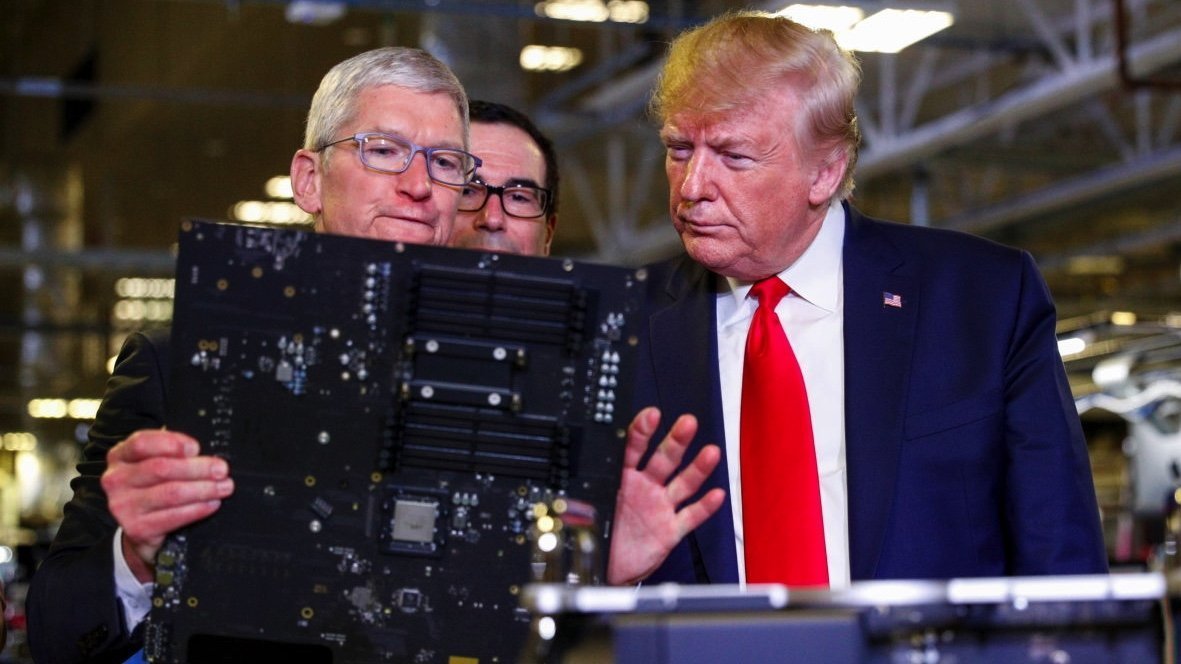Trump's tariffs could drive up iPhone prices by about 10%
Estimating the cost to Apple of paying President Trump's import tariffs, Bank of America believes that a 9% price hike for the iPhone and all other devices, would prevent losses.

Apple CEO Tim Cook [left] with Donald Trump [right] at a Mac Pro factory
It's a fiction that other countries will pay tariffs, as instead all such costs will always be borne by US companies. In the case of Apple, it has previously earned an exemption -- though not consistently -- and it has tried to reduce the impact of tariffs by moving manufacturing to different countries.
According to CNBC, this time that spreading of the manufacturing around various locations is not going to help. Bank of America now estimates that whatever Apple does with manufacturing, and wherever it does it, the company will face a minimum of a 10% tariff.
In the short term, Apple could absorb that cost and may well chose to rather than raise prices. Once a customer goes to Android because of the price, it is that much harder to get them back to the iPhone.
Should Apple simply pay the tariffs and take that hit itself, the Bank of America calculates that it would face a loss of 26 cents in earnings per share. That equates to a drop of around 3% across calendar year 2026.
One option is for Apple to increase prices, but not enough to cover its tariff costs. Bank of America says that if, for instance, it raised prices by 3%, that would mean a 2.4% slide and a per-share earnings drop of 21 cents.
The calculation is based on both the tariffs expected to affect goods or components made in various countries, and an estimate of how higher prices would mean lower sales.
If Apple passes on its increased costs to buyers, and sales decrease, Bank of America estimates that the company would need to raise prices by 9%.
As yet, it's not known what Apple will do, beyond presumably continuing to lobby for exemptions. But Bank of America analyst Wamsi Mohan says that the tariffs seem "manageable."
Read on AppleInsider

Comments
https://theweek.com/articles/460179/charts-how-rich-won-great-recession
At this point the priority is strengthening the domestic manufacturing base. This is important to the U.S. workforce, as well as strategically. In the case of a conflict with China, what use will cheap aspirin be, if it has led to there not being any functional chemical plants in the U.S., anymore, that make other important medications?
Let’s not bitch about a 10% tariff, when the last four years brought us > 25% inflation on groceries, which make for a much larger proportion of a family’s budget than an iPhone or two a year. For the one there are very well-reasoned economic policy drivers, for the other there were several very boneheaded and potentially intentionally destructive ones.
Unlike Canada, which as a "concession" just presented a plan that had already been in effect for months before Tr*mp took office, which Trump accepted knowing that his disciples would never bother to find out they were lied to (or wouldn't care), China really doesn't give a shit about making Tr*mp look good.
They're already laughing all the way to the bank:
Killing USAID has destroyed any good will and good standing the United States had in those many countries where it was active, leaving the door wide open for China to fill in the gap and deepen (trade) relations long-term.
The real difference -- and it's critically important to understand-- between then and now is that back then there was a system for selecting presidential candidates that was mostly run by elites, not the masses. Candidates were selected by party machines in the proverbial smoky back room. That process eliminated radical candidates and presented the populace with two mostly sane and reasonable, though still importantly different, choices.
Our problem today is that the system for nominating candidates, especially (apparently) in the Republican Party, has broken down, and deeply flawed people are able to become nominees.
I believe that the struggle for democracy has always been worth it, even though it has always been at risk of failing. We have not previously succumbed to the quick fix solutions like authoritarianism, monarchies, and dictatorships. Those are the easy way and lazy way out because there are no contentious arguments or struggles to reach a consensus with multiple perspectives in play. You just do what you're told and shut TF up. What is right, most humanitarian, neighborly, and seeking a better quality of life for the masses no longer matters. Those who are in charge own everything, even you.
We are heading down a path away from democracy and are in the midst of purging the experts who know what they're doing and replacing them with loyalists, regardless of their knowledge, expertise, or experience. We have anointed a new leader who cares only about himself and his fellow elites. The mind boggling thing is that we chose the easy path for ridiculously petty reasons. Our grandparents stormed the beaches of Normandy and a lot of them died trying to rid the world of an evil dictator who caused more than 60 million humans to die. Now we're putting a person and party with similar proclivities in unrestrained control, no matter the degree ... because eggs are too damn expensive and ideologies that border on pure insanity.
What the hey, it was a nice ride for nearly 250 years and now we've giving up, living in isolation, worrying about the names of bodies of water, pronouns, and 10% hike on Apple product prices. The easy way just got a whole lot harder.